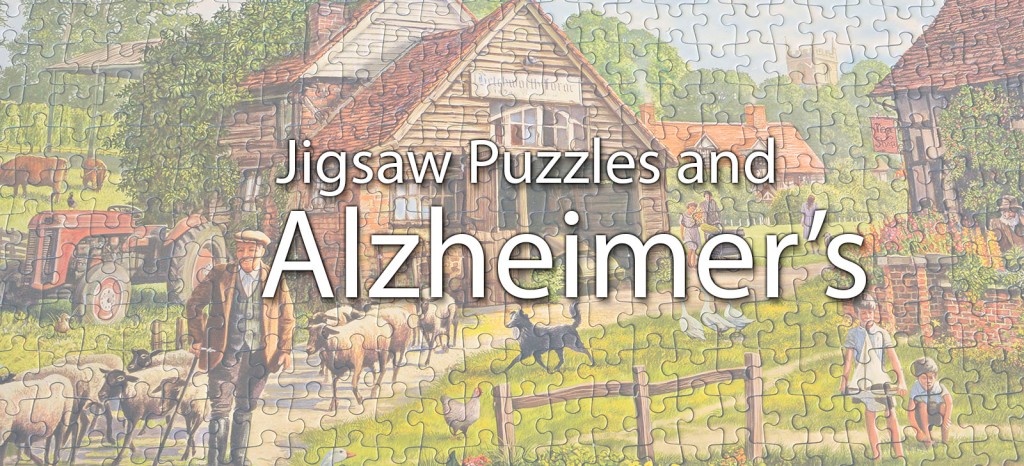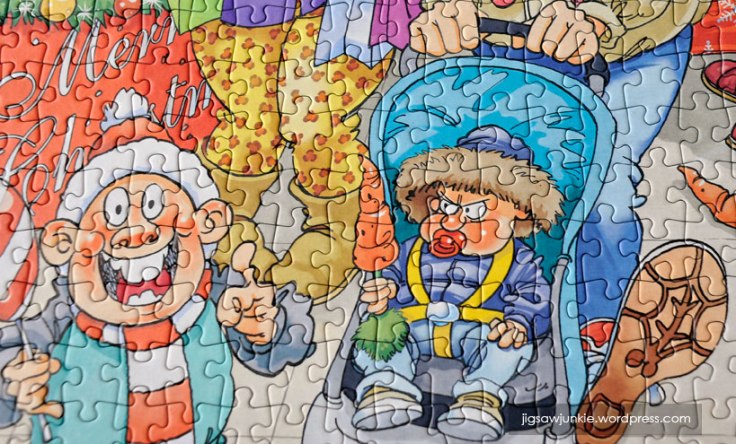
Jigsaw Puzzles and Alzheimer’s
Everyone knows that engaging in regular physical exercise, such as walking, helps the body stay healthy. There’s a reason for the saying: Use it or lose it. Your muscles can gradually lose strength and atrophy if not used regularly. That is, if you are completely sedentary. But what about your brain? Does the same principle apply?
It appears the answer is: yes. A study published in the Jan 23, 2012 “Archives of Neurology” suggests that people who ‘exercise’ their brain regularly throughout life—specifically by reading, writing, completing crosswords and other puzzles, or playing challenging games–are a lot less likely to develop the brain plaques that are linked to Alzheimer’s disease.
The study assessed 65 healthy seniors with an average age of 76 and found that Beta-amyloid protein, which is a major marker for Alzheimer’s, appeared the least in people who reported reading and working puzzles often since childhood.
The effect seems to be long-lasting. That is to say, adults who engaged in these brain-stimulating activities frequently from a young age had the least amount of the Beta-amyloid protein. In fact, their brains were comparable to those of healthy adults fifty years younger!
If you have engaged regularly with reading, puzzles, and games from a young age, this study is good news for you! If you haven’t, why not start now? The study didn’t detail what types of puzzles are best, but anything that stimulates the brain is a good bet and jigsaw puzzles are among the best.

Jigsaw puzzles help develop and maintain a number of skills.
Hand-eye coordination. The eyes see the puzzle piece and the brain formulates a hypothetical manipulation of the piece in 3D space to fit an empty place in the puzzle. The hand then moves and turns the piece accordingly.
Fine motor skills. The manipulation of the pieces helps develop motor skills and may be useful therapy for those people who are starting to lose fine motor skills.
Problem solving and logic. Jigsaw puzzles require problem solving and logic skills to determine which piece is likely to fit in a particular spot and to ‘visualize’ the missing piece you’re searching for based on the surrounding pieces.
Shape, color, and pattern recognition. Being able to see very minor differences in color or pattern, or precisely judge the size of a knob vs a hole, is a skill that is honed in someone who does jigsaw puzzles regularly and may actually be a skill that transfers over to other applications such as driving or sewing. If you’ve ever taken one of those Facebook quizzes where you have to distinguish between two ‘nearly identical’ colors, you’re testing this skill!
Memory. Did you ever play the game of “Concentration” where you turn over two cards in an array at a time, then flip them back over again? The idea is that when you come across a card you saw before, you need to remember where it was in the array. This same memory skill is frequently tested in jigsaws. For example, say you put together an area that has a gap for a piece with a small red leaf on the tip. Where did you just see that piece? Can you remember where it is in the sorting trays or on the table?
Strategy. Do you have a strategy to how you tackle a puzzle? Do you develop ways to make it more efficient and quicker? Do you assemble the border first? Do you group like colored pieces into the same sorting trays? Do you have a method when you riffle through the ‘spare piece’ box? This is your brain trying to make a repeated task more efficient and it’s good exercise for your little gray cells!
Patience and goal completion. By completing a puzzle you’re reinforcing a slow-and-steady-wins-the-race mentality and a sense of accomplishment which you can carry over to other tasks.
Besides these active skills, I find working jigsaw puzzles also relaxes me and allows my brain to ‘fly free’ and work on other thoughts or problems while a portion of my mind and body are doing the repetitive look-identify-place task. I can think about a story I’m writing or a problem I need to solve in a more relaxed, Zen-like state of mind, which can lead to ideas I wouldn’t have otherwise.
So what types of jigsaw puzzles are the best for working your brain? Honestly, any puzzles you will do frequently. Like walking, where the best type of route is the one you’ll actually be happy to do each day, with jigsaws the best type is those you enjoy and will keep working.
However, it doesn’t hurt to challenge yourself once in a while with a larger piece count or harder image than those you’re used to doing. Or put the box lid away and try working one without a reference. Try a Wasgij,where the image doesn’t match the box. Or work a Murder Mystery puzzle. Mix it up now and then to make sure you’re honing all your mental skills.

Using Puzzles to Help Treat Alzheimer’s
Unfortunately, there is no cure for Alzheimer’s, but the progression of the disease can be slowed with therapy that includes the use of jigsaw puzzles.
There’s a line of therapy puzzles called “Puzzle With Me” that has been created specifically for Alzheimer’s patients. You can view the line at Puzzle Warehouse here.

Sources:
https://childdevelopmentinfo.com/child-activities/why-puzzles-are-good-for-your-childs-development/
http://teach.com/education-technology/the-benefits-of-puzzles-in-early-childhood-development
Jane




